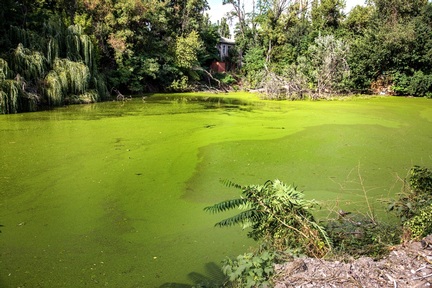Toxic algae could increase risk of Alzheimer's disease
Toxic algae found in 12 freshwater lakes and reservoirs across Britain may be responsible for an increase in dementia, scientists have warned.
Researchers in the US have discovered that a chemical called BMAA, a by-product of a common blue-green moss, is present in seafood and plants, through which it is feared it enters the food chain.

The research, published in the journal ‘Royal Society of Biology Proceedings B’, suggests that the poisonous chemical could be linked to neurological conditions such as Alzheimer’s and Motor Neurone Disease (MND).
Dr Laura Phipps, science communications manager at Alzheimer’s Research UK, said: “BMAA is a toxin produced by a type of bacteria found commonly in marine environments but present in very high concentrations in the diet of people who live on the island of Guam.
“As people on Guam experience a distinct form of neurodegenerative disease, resembling Alzheimer’s, Parkinson’s and motor neurone disease, there has been a lot of research into the link between the BMAA toxin and this condition.”
Researchers investigated the link between a toxin called BMAA and a rare neurodegenerative disease (resembling Alzheimer’s, Parkinson’s and Motor Neurone Disease) common within the Chamorro community living on the island of Guam.
BMAA is produced by a type of bacteria found in marine environments and which builds up in very high levels in the diet of people in this community.
In order to investigate whether the BMAA toxin could be responsible for the rare neurodegenerative disease, the researchers fed vervet monkeys different doses of BMAA in their food for nearly five months.
When the research team looked at the brains of the monkeys, they found a build-up of proteins, known as amyloid and tau, in the brain. The build-up of these two proteins is a hallmark of Alzheimer’s disease. These hallmark proteins were not present in the monkeys who did not receive BMAA in their diet.
The team found the highest levels of the two proteins in the brains of monkeys who received the highest doses of BMAA (10 times in excess of what a Chamorro villager would consume) than those who ate lower amounts. This led the team to conclude that BMAA could be directly responsible for toxic protein build-up in this form of neurodegenerative disease.
The researchers explored what can be done to stop BMAA from causing damage in the brain. They found that monkeys who were given a molecule called L-serine in their diet, at the same time as BMAA, had lower levels of the abnormal tau protein in their brains.
Dr Phipps added: “This research in animals suggests that BMAA exposure could directly lead to hallmark features of neurodegenerative disease, providing new insight into the likely cause of this condition on Guam.
“While investigating rare forms of dementia can lead to insights into the more common causes of the condition, further research is needed to understand whether the findings have relevance to diseases like Alzheimer’s or motor neurone disease in other parts of the world.
“We know that the majority of cases of Alzheimer’s are caused by a mix of age, genetic and lifestyle factors. Currently, the best evidence for reducing dementia risk includes not smoking, keeping blood pressure in check, getting enough exercise and eating a healthy and balanced diet.
“The research suggests that L-serine could reduce the build-up of toxic proteins in the brain associated with high levels of BMAA exposure. There are early stage clinical trials for L-serine in Motor Neuron Disease, and similar trials would be needed to explore whether L-serine could have any benefit for typical forms of Alzheimer’s, not associated with the toxin.”
However, British experts remain sceptical. Dr Doug Brown, director of research at Alzheimer's Society, said: “While this study finds that a toxin in the islanders' diet is causing this rare disease, it does not provide any evidence that the toxin contributes to Alzheimer's disease in other populations.”
Similarly, Dr Phipps added: “While investigating rare forms of dementia can lead to insights into the more common causes of the condition, further research is needed to understand whether the findings have relevance to diseases like Alzheimer’s or Motor Neurone Disease in other parts of the world.”
According to Alzheimer’s Society, an estimated 850,000 people will be living with dementia in the UK by 2015.
Latest News
 29-Jul-24
Dementia Bus gives carehome.co.uk staff insight into life with dementia
29-Jul-24
Dementia Bus gives carehome.co.uk staff insight into life with dementia
 01-Mar-24
Find out the top care homes in 2024
01-Mar-24
Find out the top care homes in 2024
 21-Mar-23
UK's top care homes in 2023 revealed
21-Mar-23
UK's top care homes in 2023 revealed
 03-Jan-23
carehome.co.uk launches free care helpline
03-Jan-23
carehome.co.uk launches free care helpline
 13-Dec-22
5 mins with Emily Whitehurst, chief operating officer for Constantia Healthcare
13-Dec-22
5 mins with Emily Whitehurst, chief operating officer for Constantia Healthcare